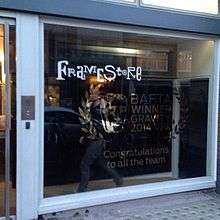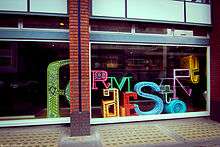Framestore

(photograph by Adam Gee)

(photograph by Alan Travers)
Framestore is a British visual effects company based near Oxford Street in London. Formed in 1986, it acquired (and subsequently merged) the Computer Film Company in 1997. The company works across several different areas of the media: feature films, commercials, music videos, feature animation and digital.
The company's registered office is at 9 Noel Street, London. In 2004, the company set up an office in New York City's SoHo district to serve the American advertising market, and has since set up offices in Los Angeles and Montreal.
History
Framestore was founded in 1986 by Sharon Reed, William Sargent, Jonathan Hills, Mike McGee and Alison Turner. Tim Webber joined Framestore in 1988 and led the company's push into digital film and television, developing Framestore’s virtual camera and motion rig systems. London's first application of computers for the creation of graphics and visual effects the company's work covered award winning images in commercials, music videos, television graphics and television drama. In 1994 its film visual effects division was set up.
In 2004 Framestore opened their first satellite office in New York City, to focus on advertising. This was followed by another office in Iceland in 2008, which has since been closed and has reopened as a local VFX company, RVX. In 2013 Framestore opened an office in Montreal, followed by another in Los Angeles the same year.
Merger with CFC
Framestore acquired the Computer Film Company (CFC) in 1997 which was one of the first digital film special effects companies, developing technology for digital film scanning, compositing, and output. It was founded in London in 1984 by Mike Boudry, Wolfgang Lempp (now CTO at Filmlight) and Neil Harris (Lightworks). CFC's first film was The Fruit Machine, in 1988, which utilised early morphing techniques.[1] In 2008, Framestore dropped the CFC from its name, becoming simply Framestore.
Achievements
Framestore and CFC's achievements in film and television have been recognised throughout the industry, with CFC being awarded two Scientific and Technical Academy Awards, and 14 Primetime Emmys. In 2008, Framestore won their first Oscar for Best Visual Effects for the film The Golden Compass; they also won the BAFTA Award for that film the same year. Framestore was also nominated for Oscars in 2007 (Superman Returns), in 2009 (The Dark Knight) and again in 2010 (Harry Potter and the Deathly Hallows – Part 1). Tim Webber was the VFX supervisor on Gravity (2013), and the techniques involved in the film realised by Webber and the Framestore team took three years to complete.[2] The team won the best visual effects awards BAFTA Award for Best Special Visual Effects at the 67th British Academy Film Awards, and the Academy Award for Best Visual Effects award at the 86th Academy Awards.[3] In advertising the team has also won all the major awards including Cannes Lions, British Television Advertising Awards, Clios, D&AD and many more.
Other achievements for the companies include the delivery of its first feature animation project The Tale of Despereaux with Universal; the completion of Europe's first digital intermediate for the film Chicken Run in 2000; contribution of scenes for the 2009 film Avatar, and the completion as a production project of four British feature films which opened in theatres between during 2009 and 2010.
The company's R&D team spun off to create leading technology company Filmlight which in 2010 received four Scientific Academy Awards.
Today Framestore delivers award winning images for feature films, television drama, advertising, console and online games, internet and mobile phone applications as Europe's largest post-production house.
Advertising and Trade Characters
Framerstore has often collaborates with companies and advertising agencies to create trade characters - Animals that are used to advertise a good or service and become associated with the brand. In 2014, Framestore worked with CARFAX to further develop their trade character CAR FOX. The newly imagined character now represents the company and appears in their national television advertising and all their marketing materials.
Acquisition by Cultural Investment Holdings Co
In November 2016, Framestore agreed to let the Shanghai-based Cultural Investment Holdings Co acquire 75% of it for £112.50 million.[4]
Recent film projects
- Guardians of the Galaxy Vol. 2
- Fantastic Beasts and Where to Find Them
- Doctor Strange
- Pan
- The Martian
- Everest
- Avengers: Age Of Ultron
- Paddington
- Dracula Untold
- Guardians of the Galaxy
- Edge of Tomorrow
- Gravity
- Wrath of the Titans
- Sherlock Holmes: A Game of Shadows
- War Horse
- Clash of the Titans
- Harry Brown
- Harry Potter and the Deathly Hallows – Part 1 and Part 2
- Nanny McPhee and the Big Bang
- Prince of Persia: The Sands of Time
- Salt
- Sherlock Holmes
- Your Highness
- The Chronicles of Narnia: The Voyage of the Dawn Treader
- Coca-Cola Siege advertisement (Super Bowl XLV)[5]
- We Steal Secrets: The Story of WikiLeaks
Past film projects
- The Affair of the Necklace
- Australia
- Avatar
- The Beach
- Blade II
- The Bone Collector
- Bright Young Things
- Casino Royale
- Cast Away
- Charlie and the Chocolate Factory
- Chased by Dinosaurs
- Cheri
- Chicken Run
- Children of Men
- The Chronicles of Narnia: Prince Caspian
- A Close Shave
- Cold Lazarus
- Cold Mountain
- The Constant Gardener
- The Dark Knight
- Die Another Day (title sequence only)
- Dinotopia
- Doctor Who (title sequence only)
- Doom
- The End of the Affair
- Enduring Love
- Enemy at the Gates
- Eyes Wide Shut
- The 51st State
- G.I. Joe: The Rise of Cobra
- Goal
- The Golden Compass
- The Good Thief & Dirty Pretty Things
- Harry Potter and the Chamber of Secrets
- Harry Potter and the Order of the Phoenix
- Harry Potter and the Prisoner of Azkaban
- Harry Potter and the Goblet of Fire
- The Jacket
- Layer Cake
- Love Actually
- Mamma Mia
- Mission: Impossible 2
- The Mummy Returns
- Nanny McPhee
- noitulovE
- Notting Hill
- Primeval
- Prehistoric Park
- The Proposition
- Quantum of Solace
- The Queen
- Resident Evil
- Sahara
- Sea
- Sexy Beast
- Skyfall
- Sleepy Hollow
- Superman Returns
- The Ballad of Big Al
- The Tale of Despereaux (under Franestore Feature Animation)
- Thunderbirds
- Troy
- Underdog
- Underworld
- V for Vendetta
- Walking with Beasts
- Walking with Cavemen
- Walking with Dinosaurs
- Walking with Monsters
- Wanted
- What Lies Beneath
- Where the Wild Things Are
- X-Men: The Last Stand
See also
References
- ↑ Rickitt, Richard (2000). Special Effects: The History and Technique. London: Virgin Publishing. ISBN 0-8230-7733-0
- ↑ "Tim Webber: the man who put Sandra Bullock in space". Evening Standard. Retrieved 17 January 2014
- ↑ Jackson, Alex. "Gravity's Oscar-Winning Visual Effects Mastermind Talks about Computer Graphics and "Weightlessness"". Nature SoapBox Science. Retrieved 9 March 2014.
- ↑ Kollewe, Julia (3 November 2016). "Harry Potter special effects firm looks east with sale to China group". The Guardian. ISSN 0261-3077. Retrieved 4 November 2016.
- ↑ "Coca-Cola - Press Center - Press Kits - "Coke Cheers" And Boys & Girls Clubs Of America". coca-colacompany.com. Retrieved 2 October 2012.
External links
Coordinates: 51°30′54.2″N 0°8′11.7″W / 51.515056°N 0.136583°W